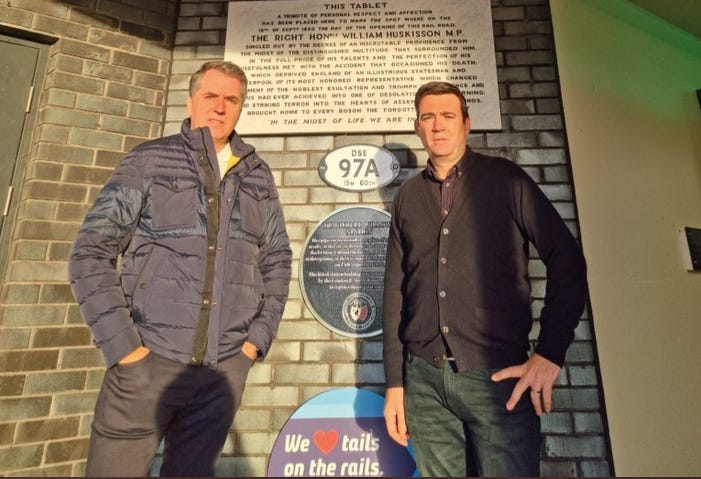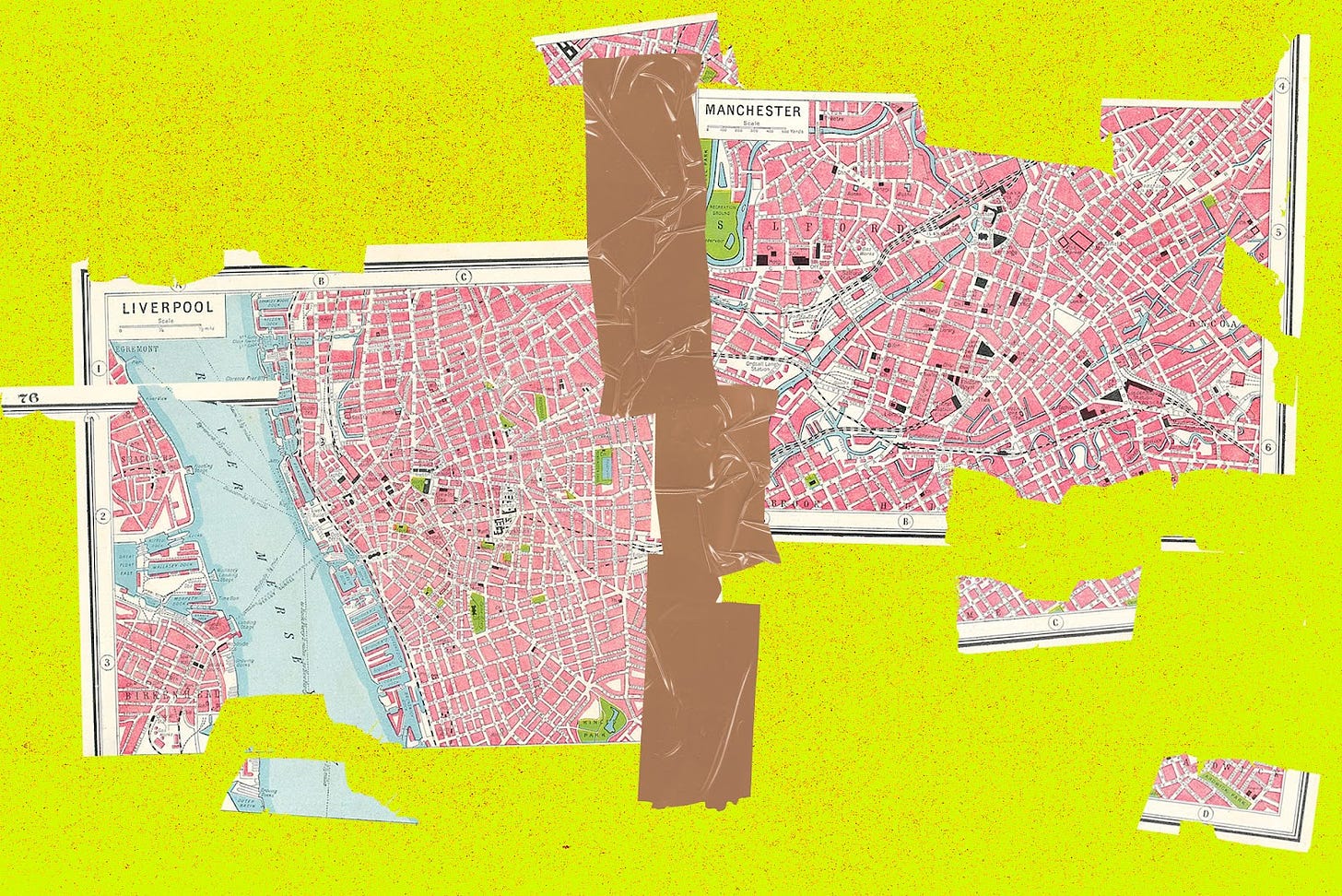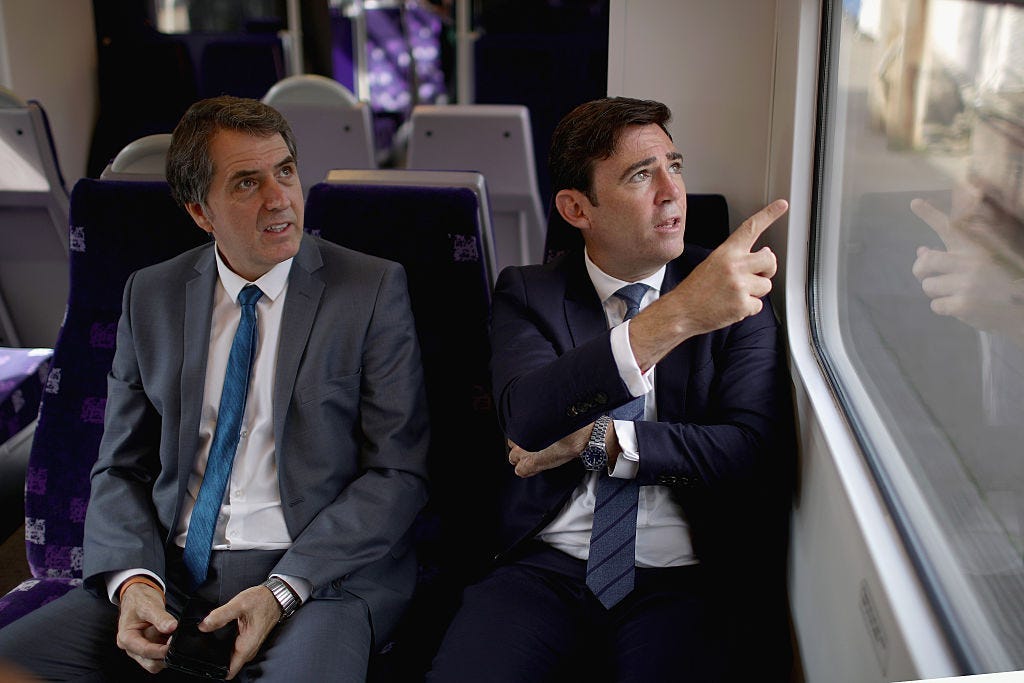Nursing old grudges will tear us apart
The Mill makes the case for bringing Manchester and Liverpool together
By David Lloyd
Roughly twenty years ago, I took a new job as editor of City Life, a well-respected Manchester culture mag. I remember my first staff meeting well. “With respect,” asked one writer. “What the fuck is a Scouser doing editing City Life?”
The same question, more politely phrased, was then asked of me over a roast loin of cod at Mr Thomas’s Chop House with Manchester’s then-council leader Sir Richard Leese. He had the good sense to follow, a beat too late, with “I’m joking”. But we both knew he wasn’t.
That meeting wasn’t the first time Leese had dangled a reconciliatory cod loin at a Scouser, mind. Three years prior, in 2001, he’d signed a joint concordat between Manchester and Liverpool, the result of a year-long study into the links between the two cities. The somewhat fishy intent was to identify areas of collaboration between the two “umbilically linked” cities, but it also made one thing very clear: Manchester was way out ahead.
If the Independent’s coverage at the time was anything to go by, it was a humiliating admission for my city, and a victory for my temporarily adoptive one. “The municipal elders of Liverpool signed off a memorandum yesterday that concedes a long-resisted truth: that their city is in Manchester's shadow,” the paper smirked. Professor Alan Harding, who wrote the report, was at least willing to throw lowly Liverpool a bone. He argued at the time that Manchester’s economic dominance "can be married with Liverpool's unique attributes”.
Perhaps Harding was just being nice, offering Liverpool an encouraging “knows their own mind” sweetener at the end of an otherwise grueling school report. But what his report tapped into, however sacrilegious, was ultimately true: these cities could learn a lot from each other, if only they could get along.
This might read like an online course on how to build a northern powerhouse, but bear with me. City A is witnessing rapid development that threatens to erase its character, and alienate its citizens. City B, half an hour’s train journey away, is suffering from faltering developments and declining investment. They both want to find a middle ground. And they both know, with every fibre in their bodies, that it’s not Warrington.
There’s a popular narrative about the Manchester-Liverpool relationship that goes something like this: Manchester won the battle of the cities but sold its soul in the process, like some Faustian morality tale reimagined in the corridors of regional municipal government, set against a spiky skyline of identikit apartments.
Liverpool, meanwhile, was allowed to keep its soul (which is spelt ‘chippy exceptionalism’ east of Wigan) for now, but wasn’t allowed a fully functioning business district. In other words, neither side really won.
I was thinking about this as Manchester went to war with itself over a humble yellow fly poster a couple of weeks back. The poster, which was widely shared online sparking huge debate, accused the city of selling its “soul” to the highest bidder while bulldozing “all remaining outposts of character”. Certainly, when I was at the Aviva Studios’ bar brushing up against bricks salvaged from the old Corrie set — offering up some kind of gauche sop to those who felt an increasing sense of displacement in the heart of the city — it was hard to disagree. Then again, many in Liverpool would look around at the city’s endless stalled development sites and shout: well-loved soul for rent, any takers?
It occurred to me that both cities have an abundance of what the other lacks. And possibly what the other needs, if we’re to both forge ahead without forgetting where we came from.
But here we are, staring at each other from either ends of the A580, unblinking. Terrified to make the first move. Sure, we’re getting a lot better at social niceties and lip service. We take our lead from our respective Mayors: self-professed best mates Andy Burnham and Steve Rotheram. “Of course”, they say, “we want to forge closer ties”. But what has that given us in practice?
Very little, to be honest. Sure, the sales from their joint book, Head North, will have added at least a few hundred pounds to the northern economy, but how about improved transport links? Well, until a few months back there was the promise of Northern Powerhouse Rail, which both Burnham and Rotheram have proudly championed. A railway board was set up to explore a £17 billion high-speed between the cities, but as of the last Labour budget that’s now on the rocks.
Can you blame the metro mayors when the government pulls the plug? Perhaps not, but it does suggest the current partnership lacks the heft to take its case to London. And besides, the relationship between the two cities is hardly a marriage of equals. Someone well-placed I know in urban regeneration recently told me that Andy Burnham instructed Steve Rotheram not to go after office jobs but, instead, run the economy of the Liverpool City Region with the receipts from tourism, shipping and life sciences (which Manchester leads in anyway). Partnerships only work when both parties are treated as equals.
Most urban policy experts and economists agree: this big brother-style approach says more about historic rivalry than smart strategy; and can only do both our cities a disservice. If both cities can’t have a grown-up discussion that serves both their interests, we’ll continue to suffer the fallout.
At this point, of course, you might say these are the aspirations of a jealous Scouser. Certainly, it’s easier to point out the potential benefits for Liverpool (perhaps we’ll finally get around to turning our rubble-strewn car parks into Grade A offices, for example). The more obvious question would be, what does Manchester have to gain?
For one thing: international investment. The University of Liverpool’s Professor Michael Parkinson has written extensively about how Liverpool-Manchester cooperation could create a stronger economic region to compete globally. The Centre for Cities think tank, too. Recent work by business-lead think tank Northern Powerhouse Partnership suggests the combined economic weight (£74.1 billion a year) could make the Liverpool-Manchester region more attractive to international investors, on a par with Berlin.
For another, we’d stand a chance to wrestle more of the spotlight away from London, which loves nothing more than to play divide and conquer. A larger, combined urban area could have more leverage, more global visibility and more clout. A merged "Manpool" would have a population approaching six million. But let’s hope the name doesn’t stick. Liverchester? Whatever, that’s not important right now.
But away from the big numbers, it means Manchester doesn’t have to carry the weight of progress and rapid growing pains alone. Few think tanks look as closely at cultural and historic losses as they do at the bottom line. But they should. And if they did, across our two cities, the scales look more balanced. What Manchester’s losing, we hang on to. If it wasn’t for economic torpor, Liverpool’s Albert Dock would have gone years ago; and much of its grand — mostly still intact — streetscape too. Collaboration can be a survival tactic, whatever end of the spectrum you start from.
Back in my City Life days, the prospect of change crackled like static electricity through Manchester’s streets. Warehouses were being sandblasted and reimagined as loft living. Cranes punctuated the skyline. The Glazers bought Man United. But Tib Street was still Tib Street. Sankeys still had a whiff of Soap about it. The city was still beautifully rough around the edges. But it wasn’t Boddies’ hops that sweetly scented the air. It was money. At that moment in time, our cities were in lockstep with each other. We both faced a fork in the road: but Liverpool took the tourist route, and Manchester the Autobahn. And here we both are. Miles apart, or 30 miles apart? That depends on your point of view.
Imagine if Liverpool and Manchester formed a real alliance, instead of tinkering around the edges and increasingly futile HS2-manifesting? It happens elsewhere: there are twin cities and combined metropolitan regions across the globe, showing how major cities can unite and, in doing so, stop one being buried beneath an offshore investment fund masquerading as duplex apartments, and the other looking over its shoulder, bitterly.
In the US, twin cities such as Minneapolis-St Pauls, and Dallas-Fort Worth prove that it can be done. Minneapolis focuses on commerce, arts and entertainment, and St Paul on government, education and residential attractions. Admittedly, they’re close, but the model works just as well in Dallas-Fort Worth: covering a metropolitan area much larger than that of Liverpool and Manchester combined. Dallas focuses on finance and business, Fort Worth on manufacturing and cultural attractions. Both pairs benefit from complementary strengths rather than direct competition. Formal regional governance structures help to keep things on track, and stop spats in their tracks. The whole is greater than the sum of two quarreling parts.

So what separates Liverpool and Manchester? Well, right now, not much. It’s a thin ribbon of moss and peat cuttings, if you must know. Check the map — only the sliver of bog life and bird hides at Risley Moss separates the two sprawls. The tendrils of Liverpool’s suburbs reach out past Halewood, Whiston and Widnes and on to Warrington and Birchwood in a continuous procession of semis, shopping malls and light industry. It’s only Risley Moss that – just – keeps the conurbations apart, before the mean streets of Partington pick up the pace again, and take you directly to Andy Burnham’s door.
In time, these two galaxies will collide. It is as inevitable as Barratt Homes building an executive estate over Risley’s sphagnum moss, and shrugging their shoulders when the owners complain that their slippers are damp every morning.
And if we’re still a bit squeamish about being official twins, what about copying the model of Randstad in the Netherlands? Here, the cities of Amsterdam, Rotterdam, The Hague and Utrecht form a slightly loser conglomerate of urban areas. It’s a region of about 8.4 million people with distinct local economies working genuinely closely together (and by closely, I mean not just saying: ‘We share net zero ambitions, and we want faster trains. Thank you, bye’).
The region operates more like a network of interconnected cities offering high skilled worker mobility, infrastructure improvements and a genuine commitment to quality of life stuff like affordable housing, green spaces and the ability to get back into town from a show at Coop Live in less than three hours (oh, no, sorry….). Working together has also strengthened the region's international competitive position. And the best bit? Utrecht remains unmistakably Utrecht (and very cool too).
And still, we fiddle with the small change. DJ battles and book tours, instead of hammering out a genuine model that could give Manchester a beach (and the most advanced deep water container terminal in Europe), Liverpool some hope, and the so-called North a real Powerhouse.

I’ve long since returned to Liverpool, but the other day I found myself back in Manchester. I walked the short route from my flat to my old place of work. The canal remains; precious little else does. Where once busy wharfs, workshops in elegant brick archways and car salvage yards gave a sense of place and purpose, a forest of beige-clad apartment blocks crowd out the sky.
My old car park was buried under 170 metres of Hilton hotel, and my office at the MEN building was razed to the ground, replaced by the dizzying gleam of Spinningfields’ boutiques. And as for the magical Ginnel antiques gallery, where I’d have lunch, that belongs to another time and place completely.
Our relationship with our home city is like the ship of Theseus. If every plank, rivet and mast has been replaced, what is it we’re clinging on to anyway? All we’re really loving are our memories. And that’s the thing with memory. For better, or worse, it outlives its location. It persists, long after the places that meant something to us have gone.
And yet, despite all the change, this othering between our two cities remains. It’s as if we’re still sulking over the ship canal. Who’s stoking it, and why? Who does it serve? Not us. Great northern cities, reduced to fighting over crumbs from London’s table: Let them eat opera, Whitehall decrees, and we all crawl and beseech to their command (and yes, I am comparing opera to crumbs. And, unless you’ve a pretty solid argument about how Così fan tutte can transport us more meaningfully than a northern Crossrail I reckon you should too).
To many, no doubt a proposal for the cities to cosi up closer will sound heretical. Many in Liverpool will be about as keen for a slice of Manchester’s unbridled gentrification and unseemly growth-at-any-costs strategy as any Manc should be jealous of Liverpool’s inept and infighting politicians. But from where I’m standing, we have more in common than we think. Maybe even a better future, too.






This is a slightly strange article.
It calls for greater cooperation between the two cities while largely ignoring the collaboration that is already happening. It is also oddly unspecific in what a closer relationship would mean in practical terms.
If we’re talking about more interconnected labour markets then improved transport links are crucial. But these are dismissed as either unrealistic or unimportant. The Liverpool-Manchester Rail Board was established as a result of Northern Powerhouse Rail being downgraded (abolished, in reality) by the previous government - its role is to develop alternatives.
If we’re talking about governance, does the author want to see a return to North West regional structures? Or is something else being proposed? He talks about Dallas/FW and Minneapolis/St Paul but relationships in these cities are largely managed bilaterally at the mayoral level and using state mechanisms.
If we’re talking the economy - to what extent can government at any level divvy up industries between places? Path dependence matters - Liverpool has a port, it has long standing strengths in manufacturing and life sciences, it is beautiful and has an incredibly strong brand internationally. Manchester is bigger and has a stronger heritage of knowledge industry, tech and finance.
I’m not sure this animosity the author identifies actually exists at any real level beyond football rivalries and a bit of banter about accents and purple bins. The two mayors work incredibly closely together, the two red brick universities have just signed a concordat to align research priorities, and proximity means there are significant overlaps in supply chains and labour markets. Beyond that we’re getting into the realm of a more formal combined administration which don’t seem particularly realistic as city-regions are the clear spatial preference of this government (as they were the last one) and earlier attempts to develop North West structures lacked public and political support.
I visit Liverpool once a year, usually at Christmas, and find that it’s done a fantastic job of marketing itself internationally as a tourist destination.
Rather than waxing lyrical, I remember being stood inside the, frankly fantastic, Museum of Liverpool and thinking “Why don’t we have a Manchester version of this?” I took out my phone and tweeted Andy Burnham that very same question. My futile effort of trying to roll a snowball down the hill, to try and bring something like *this* to Manchester.
I could almost physically feel the absence, it was so stark. Yes we’ve got Manchester Museums, but not a museum of Manchester - and having one would be glorious!
- All of Manchester’s amazing musical history and influence
- It’s role in the global stage of industry and computing
- Greatest hits from TV and Film, both in terms of the talent and shows it’s made, and the international talent it’s hosted
- It’s storied and constantly changing architecture
- Much much more
The Museum of Liverpool is a template that needs to be copied - a stunning location, amazing building, and the entire cultural history of the area packaged up and served into discrete enjoyable courses. It sets a celebratory tone that the rest of the city follows.
This article suggests Manchester does better tourism wise? It doesn’t feel that way? A visitor to Manchester might cobble together some sort of greatest hits for themselves, but I don’t think Manchester necessarily makes it easy, nor celebrates itself in quite the same way.
Dang, I am waxing lyrical after all.
I want a Museum of Manchester! Anyone fancy helping make one?